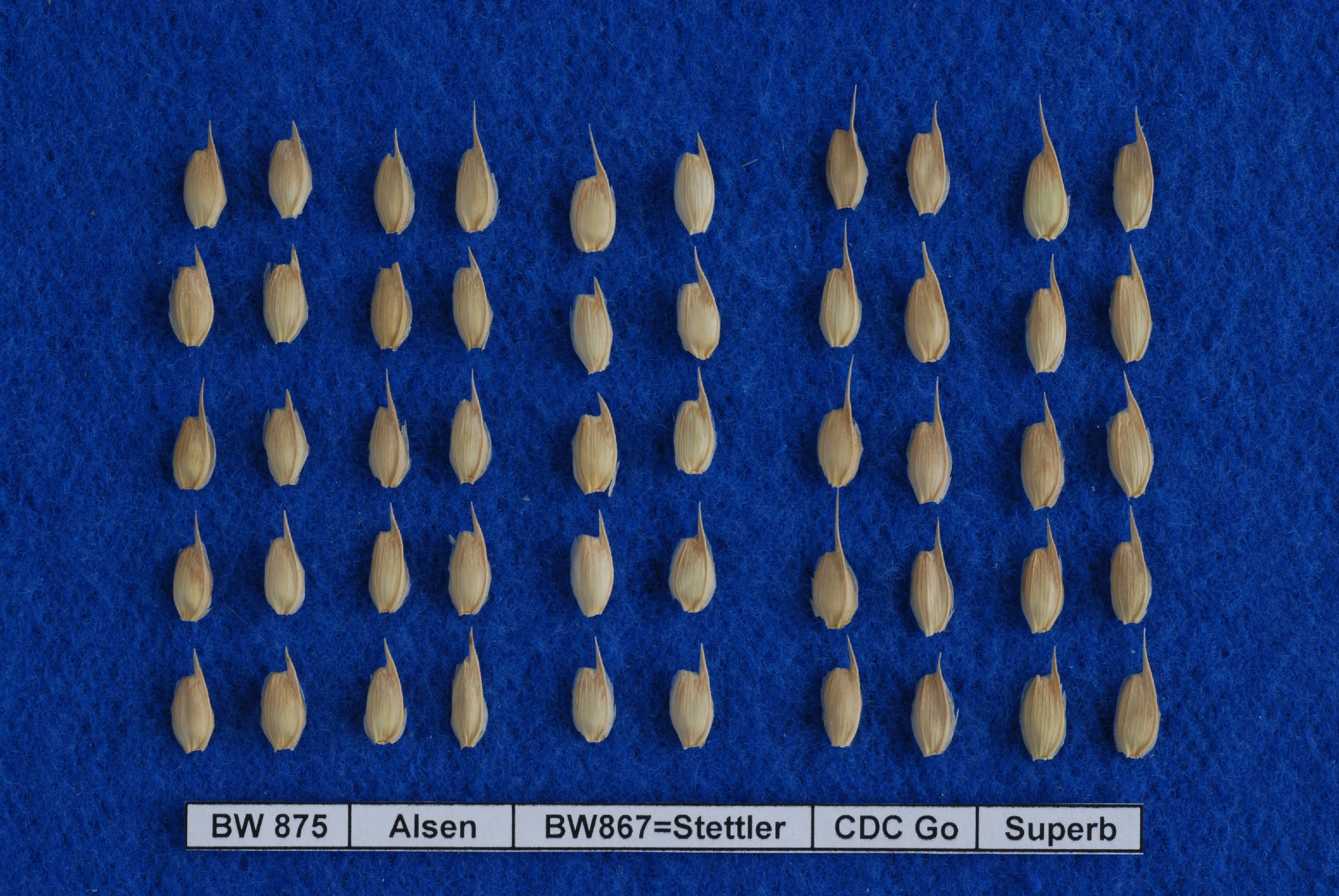Muchmore
| Denomination: | 'Muchmore' |
|---|---|
| Previously Proposed Denomination: | 'BW875' |
| Botanical Name: | Triticum aestivum |
| Applicant/Holder: |
Agriculture & Agri-Food Canada, Swift Current Research and Development Centre 1 Airport Road P.O. Box 1030 Swift Current, Saskatchewan S9H 3X2 Canada |
| Breeder: |
Ron De Pauw, Agriculture & Agri-Food Canada, Swift Current, Saskatchewan |
| Agent in Canada: |
Agriculture & Agri-Food Canada Office of Intellectual Property and Commercialization c/o Shannon Whyte 107 Science Place Saskatoon, Saskatchewan S7N 0X2 Canada Tel: (204) 999-9887 |
| Application Date: | 2009-04-20 |
| Application Number: | 09-6614 |
| Grant of Rights Date: | 2011-05-20 |
| Certificate Number: | 4062 |
| Grant of Rights Termination Date: | 2029-05-20 |
Variety Description
Varieties used for comparison: 'Alsen', 'Stettler', 'CDC Go' and 'Superb'
Summary: The plants of 'Muchmore' have an intermediate growth habit while it is semi-erect in 'Stettler'. 'Muchmore' has longer flag leaves than 'Stettler'. The frequency of plants with recurved/drooping flag leaves is medium to high in 'Muchmore' while it is low to medium in 'Stettler'. 'Muchmore' has weak to medium anthocyanin colouration of flag leaf auricles while it is absent to very weak in 'Alsen', 'Stettler', and 'CDC Go'. The plants of 'Muchmore' are shorter in height than those of 'Stettler', 'CDC Go', and 'Superb'. 'Muchmore' heads 3 days before 'Superb', but 3 days after 'CDC Go'. The spike attitude of 'Muchmore' is erect while it is inclined in 'CDC Go'. 'Muchmore' has shorter spikes than those of 'Alsen', but longer than those of 'Stettler' and 'Superb'. The kernel size of 'Muchmore' is small to medium while it is medium to large in 'Superb'. 'Muchmore' has an ovate kernel shape while it is oval in 'Alsen'. The kernel cheek shape of 'Muchmore' is angular while it is rounded in 'Alsen'.
Description:
PLANT: common spring type
SEEDLING (at four leaf stage): weak to medium intensity of anthocyanin colouration of coleoptiles, weak pubescence on lower leaf sheath and blade
GROWTH HABIT (at 5-9 tiller stage): intermediate
FLAG LEAF (at booting): medium to high frequency of plants with recurved flag leaves, weak to medium anthocyanin colouration on auricles, medium glaucosity on sheath, very weak to weak pubescence on blade and sheath
SPIKE: parallel sided, medium density, medium glaucosity, striated copper colour, erect attitude at maturity
CULM: medium glaucosity, very weak curvature at maturity
STRAW: thin pith in cross section, weak anthocyanin colouration at maturity
AWNS: present, medium length, white
LOWER GLUME: narrow to medium width, short to medium length , glabrous
LOWER GLUME SHOULDER: slightly sloping, narrow width
LOWER GLUME BEAK: slightly curved, short length
KERNEL: hard red type, small to medium size, ovate in shape, angular cheek, midlong brush hairs, large round germ, midwide to wide width with mid-deep crease
PERFORMANCE CHARACTERISTICS: good resistance to shattering, good resistance to drought, fair pre-harvest sprouting tendency, good bread quality
DISEASE REACTION: susceptible to Fusarium head blight (Fusarium graminearum, Fusarium species), moderately resistant to Loose smut (Ustilago tritici) and to Stem rust (Puccinia graminis f.sp. tritici), resistant to Common bunt (Tilletia caries Tilletia foetida) and to Leaf rust (Puccinia triticina)
Origin & Breeding History: 'Muchmore' (experimental designation 'BW875') is the result of the cross Alsen/Superb made in 2000 at the Semiarid Prairie Agricultural Research Centre of Agriculture and Agri-Food Canada, Swift Current, Saskatchewan. Doubled haploid lines were generated using the maize pollen method. In 2002, individual doubled haploid lines were inoculated with Common bunt and a rust epiphytotic nursery was established. Spikes were selected from 534 disease resistant doubled haploid lines that also matured early and had strong stems of acceptable height. In 2004, agronomic performance was assessed on 18 doubled haploid lines which were grown in Saskatchewan and Manitoba. The experimental doubled haploid line B0065&BE057 was identified based on reaction to Leaf and Stem rust, Loose smut, Common bunt, in response to fusarium, and grain quality and kernel characteristics. The experimental line was evaluated in the Western Bread Wheat 'A_3' test in 2004, Western Bread Wheat B test in 2005, and as 'BW875' in the Western Bread Wheat Cooperative test from 2006 to 2008.
Tests & Trials: The trials of 'Muchmore' (experimental designation 'BW875') were conducted during 2008 and 2009 at the Agriculture and Agri-food Canada Research Station, Swift Current, Saskatchewan. A 4 repetitions randomised complete block design was planted with each replicate consisting of 4 rows, measuring 3 metres in length spaced 23 cm apart. Kernel characteristics were described by the Inspection Division, Canadian Grain Commission. 'Muchmore' was also trialed and tested for agronomic characteristics, disease reaction, and end-use suitability in the Western Bread Wheat Cooperative Test 2006-2008.
Comparison tables for 'Muchmore' with reference varieties 'Alsen', 'Stettler', 'CDC Go' and 'Superb'
Flag leaf: length (cm)
| 'Muchmore' | 'Alsen' | 'Stettler' | 'CDC Go' | 'Superb' | |
|---|---|---|---|---|---|
| mean | 20.2 | 21.7 | 18.1 | 20.2 | 18.8 |
| std. deviation | 4.0 | 4.9 | 4.1 | 4.9 | 4.0 |
Heading (number of days from planting to 50% of heads fully emerged from boot)
| 'Muchmore' | 'Alsen' | 'Stettler' | 'CDC Go' | 'Superb' | |
|---|---|---|---|---|---|
| mean | 60.4 | 61.3 | 61.3 | 57.4 | 63.0 |
Height (cm)
| 'Muchmore' | 'Alsen' | 'Stettler' | 'CDC Go' | 'Superb' | |
|---|---|---|---|---|---|
| mean | 85.4 | 88.7 | 92.7 | 89.8 | 91.4 |
| std. deviation | 3.3 | 3.0 | 2.9 | 3.3 | 2.5 |
Spike: length (excluding awns and awnlets) (cm)
| 'Muchmore' | 'Alsen' | 'Stettler' | 'CDC Go' | 'Superb' | |
|---|---|---|---|---|---|
| mean | 8.5 | 9.0 | 8.1 | 8.6 | 8.3 |
| std. deviation | 0.4 | 0.4 | 0.4 | 0.3 | 0.3 |
Click on image for larger view

Wheat: 'Muchmore' (BW875) (left) with reference varieties 'Alsen' (centre left), 'Stettler' (centre), 'CDC Go' (centre right), and 'Superb' (right)
- Date modified: